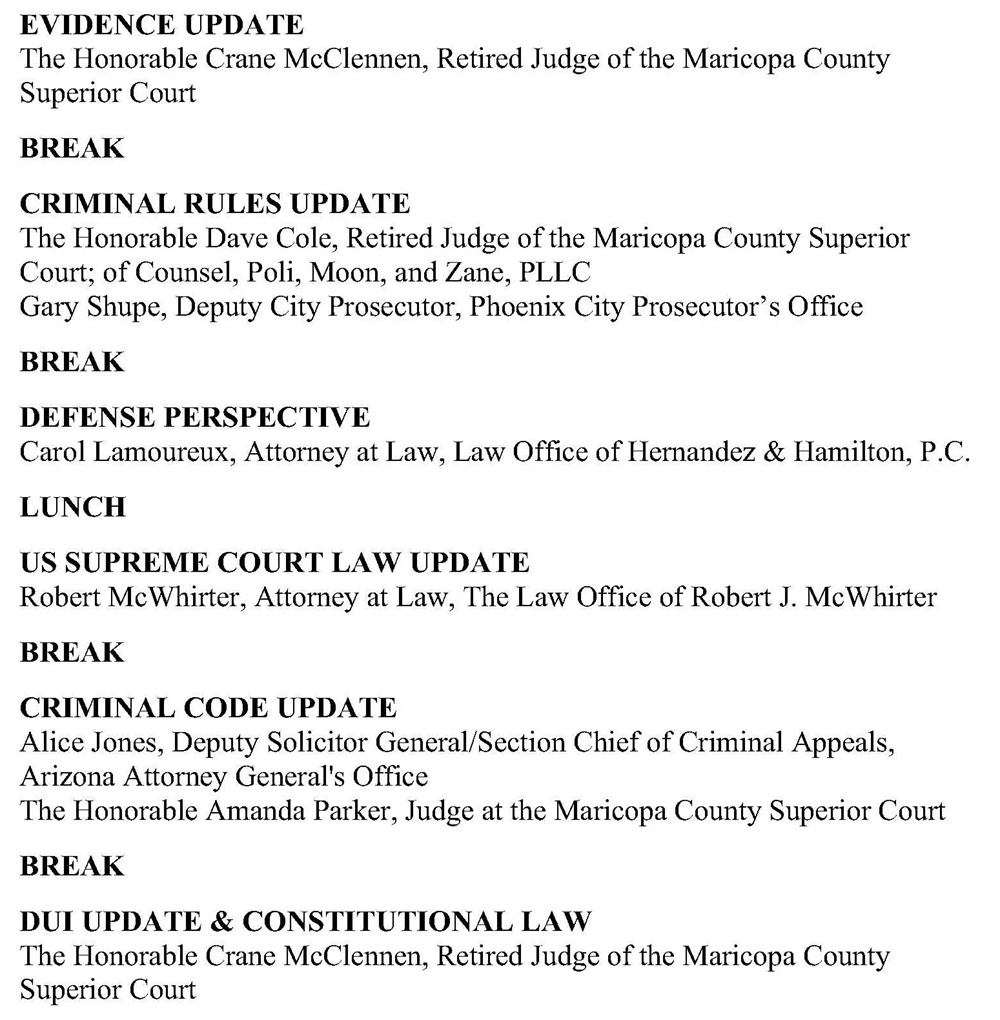The 41st Annual Criminal Year Seminar| Presented by APAAC and CLE West | April 28, 2023 | OnDemand
Total Credits: 6.0 including 6.0 CLE, 1.0 Ethics
- Average Rating:
- 16
- Categories:
- OnDemand | APAAC | 2023 OnDemand | 2023 Criminal Year Seminar
- Faculty:
- Hon. Crane McClennen | The Honorable Dave Cole | Gary Shupe | Carol Lamoureux | Robert J. McWhirter | Amanda Parker | Alice Jones
- Duration:
- 6 Hours 02 Minutes
- Format:
- Audio and Video
- License:
- Access for 1 year(s) after purchase.
Tags: APAAC Criminal Year New Seminar
Description
Our elite faculty covers the most critical cases of 2022 and 2023 from the U.S. Supreme Court, Arizona Supreme Court and Arizona Court of Appeals. These cases are analyzed for both prosecutors and defense counsel by our judges and other faculty members. And covers criminal procedure, evidence, criminal substantive law, and constitutional issues.
This one day seminar features presentations in the following areas from the following faculty members:
- The Hon. Crane McClennen, Retired Judge of the Maricopa County Superior Court.
Evidence Law
- Alice Jones, Chief Counsel, Criminal Appeals Section, Arizona Attorney Generals Office.
- The Hon. Amanda Parker, Judge of the Maricopa County Superior Court.
Criminal Substantive Law
- The Hon. Dave Cole, Retired Judge of the Maricopa County Superior Court; of counsel, Poli, Moon, and Zane.
- Gary Shupe, Deputy City Prosecutor, City of Phoenix.
Criminal Procedural Law
- Robert McWhirter, Attorney at Law, The Law Offices of Robert J. McWhirter. U.S.
Supreme Court Law Update
- Carol Lamoureux, Attorney at Law, The Law Office of Hernandez & Hamilton, PC.
Cases from the Defense Prospective
AREAS COVERED WILL INCLUDE
Cases from the Defense Prospective
- Cruz v. Arizona, 2023 WL 2144416 (U.S.): What constitutes a significant change in the law and when will it be applied retroactively.
- Reed, 502 P.3d 979 (Sup. Ct.): When and to what extent is a victim entitled to restitution for attorneys’ fees.
- Willis v. Bernini, 515 P.3d 142 (Sup. Ct.): What is the extent of the prosecutor’s duty to present exculpatory evidence to the grand jurors.
- Fierro, 517 P.3d 635 (Sup. Ct.): For attempted second‑degree murder, what jury instruction must the trial court give, and was the error really harmless.
- Teran, 510 P.3d 502 (Ct. App.): DUI: When must the trial court instruct on the respective duties and rights of a pedestrian and a driver.
- Wilson, 510 P.3d 528 (Ct. App.): When is the defendant entitled to a jury instruction on justification in the use of force in crime prevention.
- Ibarra, 522 P.3d 1111 (Ct. App.): For a marijuana conviction, when must the trial court grant a petition for expungement of records.
- State ex rel. Adel v. Adleman, 503 P.3d 120 (Sup. Ct.): For a jail inmate, what must the inmate’s attorney do to establish the attorney‑client privilege for telephone calls between the inmate and the attorney.
- Copeland, 509 P.3d 412 (Ct. App.): When will the admission of hearsay evidence entitle the defendant to a new trial.
- Stowe, 520 P.3d 1193 (Ct. App.): DUI: To be entitled to suspension from the sentence for the increased number of days for the installation of an ignition interlock device, must the person own a motor vehicle.
DUI and Traffic
28–672 Causing serious physical injury or death by a moving violation
- Teran, 510 P.3d 502 (Ct. App.): Is causing serious physical injury or death by a moving violation a lesser‑included offense of homicide.
28–1382(I) Ignition interlock device
- Stowe, 520 P.3d 1193 (Ct. App.): DUI: To be entitled to suspension from the sentence for the increased number of days for the installation of an ignition interlock device, must the person own a motor vehicle.
Constitutional Law
4th Amendment
- Allen (Sammantha), 513 P.3d 282 (Sup. Ct.): What gives an officer the probable cause to arrest, and does the suspect have a reasonable expectation of privacy in a police interrogation room.
- MacHardy, 521 P.3d 613 (Ct. App.): Does a suspect have a reasonable expectation of privacy in files in BitTorrent, a peer‑to‑peer file sharing network, and may the officers arrest the suspect when they are serving a search warrant.
- Thompson, 502 P.3d 437 (Sup. Ct.): Does commission of a traffic violation give an officer a reasonable suspicion to stop the vehicle, and what actions of a narcotics dog will give the officer the right to search the vehicle.
5th Amendment
- Thompson, 502 P.3d 437 (Sup. Ct.): When will a prosecutor’s argument about failure to produce evidence be considered a comment on the defendant’s failure to testify.
6th Amendment
- Allen (Sammantha), 513 P.3d 282 (Sup. Ct.): When would hearsay statements offered to show the effect on the listener and not for the truth of the matter asserted be relevant and thus permissible.
- Copeland, 509 P.3d 412 (Ct. App.): When would hearsay statements offered to show the effect on the listener and not for the truth of the matter asserted not be relevant and thus not permissible.
14th Amendment
- Mandell (Matthews), 509 P.3d 405, ¶¶ 10–16 (Ct. App.): What showing must a defendant make to be entitled to an in camera review of the victim’s medical or mental health records.
Criminal Substantive Law
13–411 Justification; Use of Force in Crime Prevention
- Wilson, 510 P.3d 528 (Ct. App.): When is a defendant entitled to an instruction on justification in the use of force in crime prevention and defense of residential structure or occupied vehicle.
13–708 Offenses Committed While Released From Confinement
- Shortman, 523 P.3d 405 (Ct. App.): When a defendant commits an offense while on probation, parole, work furlough, community supervision, or other release or escape, must the trial court impose at least a flat‑time presumptive sentence.
13–1104 Attempted Second-Degree Murder
- Fierro, 517 P.3d 635 (Sup. Ct.): Is a person is guilty of attempted second‑degree murder if the person intends only to cause serious physical injury.
13–3408(A) Possession of Narcotic Drugs
- Romero‑Millan v. Barr, 507 P.3d 999 (Sup. Ct.): Must a state court conduct a divisibility analysis under Arizona law, and for possession of a narcotic drugs, must the jurors unanimously decide which specific drug the defendant possessed.
13–3612 Contributing to Dependency or Delinquency of a Minor
- Agueda, 513 P.3d 112 (Sup. Ct.): Is contributing to the delinquency of a minor a lesser‑included offense of sexual conduct with a minor under 15.
13–4032 Right to Appeal by State
- Santillanes, 522 P.3d 691 (Ct. App.); Crain, 512 P.3d 97 (Ct. App.); Moore, 522 P.3d 1108 (Ct. App.): Does the state have the right to appeal from (1) trial court’s order granting expungement a defendant’s conviction, (2) the trial court’s order denying the state’s motion to modify sentence under Rule 24.3, or (3) the trial court’s order terminating probation.
17–309 Wildlife Violation
- Hamberlin, 515 P.3d 159 (Ct. App.): What must the state present to show a violation of this statute.
21–312 Juror Records
- Morgan v. Dickerson, 511 P.3d 202 (Sup. Ct.): Does the defendant have the right of access to names of jurors seated for trial.
Criminal Procedural Law
Rule 7.2(b)(4) Right to Release Before Conviction
- Sills v. Coates, 506 P.3d 28 (Ct. App.): May a trial court conduct a bail eligibility hearing while the defendant is undergoing competency restoration treatment.
Rule 11.2(a) Motion for an Examination of a Defendant’s Competence To Stand Trial
- LaCount v. Mroz, 508 P.3d 799 (Ct. App.): In what circumstances may a trial court order a competency evaluation on its own motion.
Rule 11.4(b) Disclosure of Expert’s Reports
- King v. Starr, 522 P.3d 195(Ct. App.): If a trial court determines reasonable grounds exist for an examination to determine the defendant’s competency, and the defendant retains his or her own expert under § 13–4505(E) to conduct additional examinations, will the defendant’s expert be permitted to testify at trial.
Rule 13.1(a) Indictment and Information
- Copeland, 509 P.3d 412 (Ct. App.): What elements are necessary for a proper indictment or information.
Rule 13.4(a) Severance
- Allen (Sammantha), 513 P.3d 282 (Sup Ct.): When is severance of counts warranted under a “rub‑of” theory; what happens when a defendant does not seek suppression of statements prior to trial, and does not renew a motion to sever either during trial or at the close of the evidence.
Rule 18.1(b) Waiver of Trial by Jury
- Muhammad, 513 P.3d 1095 (Sup Ct.); MacHardy, 521 P.3d 613 (Ct. App.): What must the trial court do when a defendant wants to waive the right to a trial by jury.
Rule 19.1 Conduct of Trial
- Thompson, 502 P.3d 437 (Sup Ct.): When would an experienced prosecutor’s statement be considered clearly improper and inexcusable.
- Shortman, 523 P.3d 405 (Ct. App.): What is the extent of the court’s discretion in the conduct of the proceeding; what is the difference between “prosecutorial misconduct” and “prosecutorial error,” and what would prosecutorial vouching be considered.
Rule 24.4 Clerical Error
- Shinn v. Arizona Bd. Ex. Clem., 521 P.3d 997 (Sup Ct.): What constitutes clerical errors, omissions, and oversights in the record that a trial court has authority to correct, and what elements are necessary for a judgment to be valid.
Rule 32.1(g) Significant Change in the Law
- Evans, 506 P.3d 819 (Ct. App.); Wagner, 510 P.3d 1083 (Ct. App.): What is a “significant change in the law” and when may it be applied retroactively.
Rule 32.7(a) Petition for Post-Conviction Relief—“Prisoner Mailbox Rule”
- Young, 513 P.3d 343 (Ct. App.): What is the “prisoner mailbox rule,” and what must a prisoner do to file legal documents under this rule.
Evidence
Rules 401, 402, and 403. Relevance and Exclusion
- Gomez, 482 P.3d 397 (Sup. Ct.); Thompson, 502 P.3d 437 (Sup. Ct.); Allen (Sammantha), 513 P.3d 282 (Sup. Ct.): What are the steps in a Rule 403 analysis for evidence in general and photographs in particular.
Rule 404. Other Crimes, Wrongs, or Acts
- Allen (Sammantha), 513 P.3d 282 (Sup. Ct.): How does Rule 404(b) affect a motion to sever under Rule 13.4.
Rule 501. Privilege
- Allen (Sammantha), 513 P.3d 282 (Sup. Ct.): Does the marital privilege exist in a police interrogation room.
- J.F. v. Como (C.F.), 514 P.3d 299 (Ct. App.); LaBianca (Pedro), 520 P.3d 1196 (Ct. App.): What conduct will waive the privilege.
- Mandell (Matthews), 509 P.3d 405 (Ct. App.): What is the process for obtaining privileged records in the possession of a third party (doctor, mental health treatment facility).
Rule 601. Witnesses
- Castaneda, 517 P.3d 53 (Ct. App.): What are the considerations in determining whether a 5-year-old witness is competent.
- Copeland, 509 P.3d 412 (Ct. App.): Can use of a leading question lead to an ethical violation.
Rule 701. Opinion Testimony by a Lay Witness
- Thompson, 502 P.3d 437 (Sup. Ct.): What are the requirements for a lay witness.
Rule 702. Opinion Testimony by an Expert Witness
- Thompson, 502 P.3d 437 (Sup. Ct.): What are the requirements for an expert witness.
- Teran, 510 P.3d 502 (Ct. App.): What happens when the expert witness does not have the right qualifications.
- Thompson, 502 P.3d 437 (Sup. Ct.): What happens when the expert witness does not have a sufficient factual basis.
Rule 801. Hearsay
- Allen (Sammantha), 513 P.3d 282 (Sup. Ct.): What happens when the hearsay is offered not to prove the truth of the matter asserted, and the effect on the hearer is relevant.
- Copeland, 509 P.3d 412 (Ct. App.): What happens when the hearsay is offered not to prove the truth of the matter asserted, but the effect on the hearer is not relevant.
- Copeland, 509 P.3d 412 (Ct. App.): What must a party do to introduce a prior inconsistent statement.
- Allen (Sammantha), 513 P.3d 282 (Sup. Ct.): Is it time to kill the corpus delicti doctrine.

Handouts
| 41st Annual Criminal Year Seminar Materials | Available after Purchase | ||
Faculty

Hon. Crane McClennen Related Seminars and Products
Maricopa County Superior Court
The Honorable Dave Cole Related Seminars and Products
Retired Judge, Maricopa County Superior Court; of Counsel, Poli, Moon, and Zane
Gary Shupe Related Seminars and Products
Assistant City Prosecutor
City of Phoenix. Criminal Procedural Law
Carol Lamoureux Related Seminars and Products
Attorney at Law
The Law Office of Hernandez & Hamilton, PC.

Robert J. McWhirter Related Seminars and Products
Attorney at Law
The Law Offices of Robert J. McWhirter. U.S.
Amanda Parker Related Seminars and Products
Honorable Judge
Maricopa County Superior Court
Amanda graduated summa cum laude from the Grand Canyon University with a Bachelor of Science Degree in Justice Studies and a minor in Spanish. She attended the George Washington University Law School in Washington, D.C., where she served as a member of the Federal Circuit Bar Journal and the Hispanic Law Student Association's Community Service Committee.
Amanda joined the Maricopa County Attorney's Office in 2012. She clerked for the Honorable Michael T. Liburdi on the United States District Court for the District of Arizona. Amanda is currently the Bureau Chief of the Appeals & Post-Conviction Proceedings Bureau at the Maricopa County Attorney's Office. In that role, she oversees post-conviction proceedings, State's appeals, special action proceedings, appeals from justice courts, probation violation proceedings, and domestic and international extraditions.
Amanda earned her division's Attorney of the Year award at the Maricopa County Attorney's Office in 2017. She was nominated for APAAC's Appellate Prosecutor of the Year award in 2019. Amanda completed the Arizona State Bar's Bar Leadership Institute program in 2019 and presently serves on the Arizona State Bar's Appointments Committee.
Amanda has argued numerous times in the Maricopa County Superior Court, the Arizona Court of Appeals, and the Arizona Supreme Court. She has also represented the State of Arizona in petitions for writ of certiorari at the United States Supreme Court.


